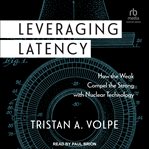Nonfiction
eAudiobook
Details
PUBLISHED
Made available through hoopla
EDITION
DESCRIPTION
1 online resource (1 audio file (8hr., 12 min.)) : digital
ISBN/ISSN
LANGUAGE
NOTES
Read by Paul Brion
When does nuclear latency-the technical capacity to build the bomb-enable states to pursue effective coercion? In Leveraging Latency, Tristan A. Volpe argues that having greater capacity to build weaponry doesn't translate to greater coercive advantage. Volpe finds that there is a trade-off between threatening proliferation and promising nuclear restraint. States need just enough bomb-making capacity to threaten proliferation, but not so much that it becomes too difficult for them to offer nonproliferation assurances. The boundaries of this sweet spot align with the capacity to produce the fissile material at the heart of an atomic weapon. To test this argument, Volpe includes comparative case studies of four countries that leveraged latency against superpowers: Japan, West Germany, North Korea, and Iran. In doing so, Volpe identifies a generalizable mechanism-the threat-assurance trade-off-that explains why more power often makes compellence less likely to work. This framework illuminates how technology shapes broader bargaining dynamics and helps to refine policy options for inhibiting the spread of nuclear weapons. As nuclear technology continues to cast a shadow over the global landscape, Leveraging Latency provides a systematic assessment of its coercive utility
Mode of access: World Wide Web







